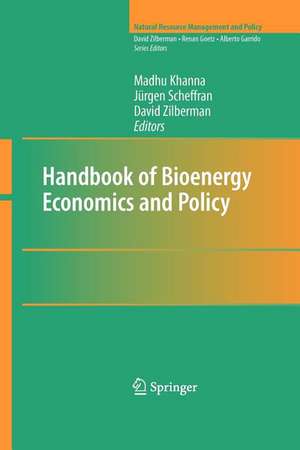Handbook of Bioenergy Economics and Policy: Natural Resource Management and Policy, cartea 33
Editat de Madhu Khanna, Jürgen Scheffran, David Zilbermanen Limba Engleză Paperback – 25 feb 2012
The book is organized into five parts. The introductory part provides a context for the emerging economic and policy challenges related to bioenergy and the motivations for biofuels as an energy source. The second part of the handbook includes chapters that examine the implications of expanded production of first generation biofuels for the allocation of land between food and fuel and for food/feed prices and trade in biofuels as well as the potential for technology improvements to mitigate the food vs. fuel competition for land. Chapters in the third part examine the infrastructural and logistical challenges posed by large scale biofuel production and the factors that will influence the location of biorefineries and the mix of feedstocks they use. The fourth part includes chapters that examine the environmental implications of biofuels, their implications for the design of policies and the unintended environmental consequences of existing biofuel policies. The final part presents economic analysis of the market, social welfare, and distributional effects of biofuel policies.
| Toate formatele și edițiile | Preț | Express |
|---|---|---|
| Paperback (1) | 1551.11 lei 6-8 săpt. | |
| Springer – 25 feb 2012 | 1551.11 lei 6-8 săpt. | |
| Hardback (1) | 1557.27 lei 6-8 săpt. | |
| Springer – 3 dec 2009 | 1557.27 lei 6-8 săpt. |
Din seria Natural Resource Management and Policy
- 18%
 Preț: 1226.24 lei
Preț: 1226.24 lei - 18%
 Preț: 958.56 lei
Preț: 958.56 lei - 18%
 Preț: 958.38 lei
Preț: 958.38 lei - 18%
 Preț: 1223.74 lei
Preț: 1223.74 lei - 18%
 Preț: 948.29 lei
Preț: 948.29 lei - 15%
 Preț: 641.03 lei
Preț: 641.03 lei - 18%
 Preț: 954.93 lei
Preț: 954.93 lei - 15%
 Preț: 646.43 lei
Preț: 646.43 lei - 18%
 Preț: 955.08 lei
Preț: 955.08 lei - 18%
 Preț: 1233.37 lei
Preț: 1233.37 lei - 15%
 Preț: 651.84 lei
Preț: 651.84 lei - 18%
 Preț: 951.47 lei
Preț: 951.47 lei - 18%
 Preț: 1229.73 lei
Preț: 1229.73 lei - 18%
 Preț: 1229.28 lei
Preț: 1229.28 lei - 15%
 Preț: 643.00 lei
Preț: 643.00 lei - 18%
 Preț: 1237.14 lei
Preț: 1237.14 lei - 15%
 Preț: 645.79 lei
Preț: 645.79 lei - 15%
 Preț: 650.86 lei
Preț: 650.86 lei - 15%
 Preț: 653.14 lei
Preț: 653.14 lei - 18%
 Preț: 1233.52 lei
Preț: 1233.52 lei - 18%
 Preț: 1233.20 lei
Preț: 1233.20 lei - 18%
 Preț: 950.96 lei
Preț: 950.96 lei - 18%
 Preț: 1242.21 lei
Preț: 1242.21 lei - 18%
 Preț: 1222.01 lei
Preț: 1222.01 lei - 18%
 Preț: 951.29 lei
Preț: 951.29 lei
Preț: 1551.11 lei
Preț vechi: 1891.60 lei
-18% Nou
Puncte Express: 2327
Preț estimativ în valută:
296.81€ • 310.52$ • 246.56£
296.81€ • 310.52$ • 246.56£
Carte tipărită la comandă
Livrare economică 02-16 aprilie
Preluare comenzi: 021 569.72.76
Specificații
ISBN-13: 9781461425045
ISBN-10: 1461425042
Pagini: 456
Ilustrații: XIV, 439 p. 88 illus.
Dimensiuni: 155 x 235 x 24 mm
Greutate: 0.64 kg
Ediția:2010
Editura: Springer
Colecția Springer
Seria Natural Resource Management and Policy
Locul publicării:New York, NY, United States
ISBN-10: 1461425042
Pagini: 456
Ilustrații: XIV, 439 p. 88 illus.
Dimensiuni: 155 x 235 x 24 mm
Greutate: 0.64 kg
Ediția:2010
Editura: Springer
Colecția Springer
Seria Natural Resource Management and Policy
Locul publicării:New York, NY, United States
Public țintă
ResearchCuprins
Bioenergy Economics and Policy: Introduction and Overview.- Are Biofuels the Best Use of Sunlight?.- Perennial Grasses as Second-Generation Sustainable Feedstocks Without Conflict with Food Production.- Present and Future Possibilities for the Deconstruction and Utilization of Lignocellulosic Biomass.- Interactions Between Biofuels, Agricultural Markets and Trade.- Price Transmission in the US Ethanol Market.- Biofuels and Agricultural Growth: Challenges for Developing Agricultural Economies and Opportunities for Investment.- Prospects for Ethanol and Biodiesel, 2008 to 2017 and Impacts on Agriculture and Food.- The Global Bioenergy Expansion: How Large Are the Food?Fuel Trade-Offs?.- Demand Behavior and Commodity Price Volatility Under Evolving Biofuel Markets and Policies.- Designing the Infrastructure for Biofuels.- Optimizing the Biofuels Infrastructure: Transportation Networks and Biorefinery Locations in Illinois.- The Capital Efficiency Challenge of Bioenergy Models: The Case of Flex Mills in Brazil.- Environmental Effects of Biofuels and Biofuel Policies.- Could Bioenergy Be Used to Harvest the Greenhouse: An Economic Investigation of Bioenergy and Climate Change?.- A Simple Framework for Regulation of Biofuels.- Market and Social Welfare Effects of the Renewable Fuels Standard.- US–Brazil Trade in Biofuels: Determinants, Constraints, and Implications for Trade Policy.- Food and Biofuel in a Global Environment.- Meeting Biofuels Targets: Implications for Land Use, Greenhouse Gas Emissions, and Nitrogen Use in Illinois.- Corn Stover Harvesting: Potential Supply and Water Quality Implications.- Economic Effects of Bioenergy Policies.- International Trade Patterns and Policy for Ethanol in the United States.- The Welfare Economics of Biofuel Tax Credits andMandates.- Biofuels, Policy Options, and Their Implications: Analyses Using Partial and General Equilibrium Approaches.- Welfare and Equity Implications of Commercial Biofuel.- European Biofuel Policy: How Far Will Public Support Go?.- Conclusions.
Textul de pe ultima copertă
Concerns about energy security, uncertainty about oil prices, declining oil reserves, and global climate change are fueling a shift towards bioenergy as a renewable alternative to fossil fuels. Public policies and private investments around the globe are aiming to increase local capacity to produce biofuels. A key constraint to the expansion of biofuel production is the limited amount of land available to meet the needs for fuel, feed, and food in the coming decades. Large-scale biofuel production raises concerns about food versus fuel tradeoffs, about demands for natural resources such as water, and about potential impacts on environmental quality.
The book is organized into five parts. The introductory part provides a context for the emerging economic and policy challenges related to bioenergy and the motivations for biofuels as an energy source. The second part of the handbook includes chapters that examine the implications of expanded production of first generation biofuels for the allocation of land between food and fuel and for food/feed prices and trade in biofuels as well as the potential for technology improvements to mitigate the food vs. fuel competition for land. Chapters in the third part examine the infrastructural and logistical challenges posed by large scale biofuel production and the factors that will influence the location of biorefineries and the mix of feedstocks they use. The fourth part includes chapters that examine the environmental implications of biofuels, their implications for the design of policies and the unintended environmental consequences of existing biofuel policies. The final part presents economic analysis of the market, social welfare, and distributional effects of biofuel policies.
The book is organized into five parts. The introductory part provides a context for the emerging economic and policy challenges related to bioenergy and the motivations for biofuels as an energy source. The second part of the handbook includes chapters that examine the implications of expanded production of first generation biofuels for the allocation of land between food and fuel and for food/feed prices and trade in biofuels as well as the potential for technology improvements to mitigate the food vs. fuel competition for land. Chapters in the third part examine the infrastructural and logistical challenges posed by large scale biofuel production and the factors that will influence the location of biorefineries and the mix of feedstocks they use. The fourth part includes chapters that examine the environmental implications of biofuels, their implications for the design of policies and the unintended environmental consequences of existing biofuel policies. The final part presents economic analysis of the market, social welfare, and distributional effects of biofuel policies.
Caracteristici
Presents the latest research on the economics of land allocation between food and fuel and the current state of knowledge about feedstocks and technology Examines bioenergy from a global perspective Discusses the impact of bioenergy production on international trade and the environment Puts forward the welfare and environmental effects of alternative policy interventions to support biofuel production Offers not only fresh empirical research on controversial issues, but provides implications for industry and policy Includes supplementary material: sn.pub/extras














